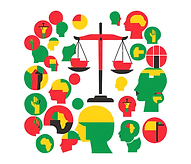KPAC24: Building Trust, Pacifying Power, Connecting Realities

The participants in the KPSRL network identified the three key dynamic processes of trust building, pacifying power, and connecting realities as sites that sustain the promise of future positive impact for security and rule of law actions. They shared the intuition that engaging in these processes is the same as engaging to create positive impact.
Building Trust
Building trust is the firm belief in the reliability or ability of other groups in society, power holders, or others/outsiders, is the central process whose presence prevents social conflict but whose absence is becoming ever more conspicuous in world events, in the current crisis of democracy, geopolitical confrontations, and always-already haunting institutions and people emerging from colonial structures.
Pacifying Power
Power is needed to protect, sustain, and guarantee a decent life for the people, but all too often it turns on the people to repress their desires, creativity, and autonomy. Pacifying power is then the process of retaining and building the capacity of power structures to meet their communities’ needs and desires (from the State to local and traditional authorities to self-organized collectives to regional/interstates organizations), but at the same time shifting the practices and perspectives of power holders so they do not use power violently or outside of the rules of the game.
Connecting Realities
Connecting realities is essential for the social processes of building trust and pacifying power. Dominant narratives are bound to remain static and inadequate in describing actors, needs, and aspirations that they have no means to understand nor represent faithfully. The short-circuiting of dominant narratives happens only when familiar topics and concepts are looked at from marginalized perspectives and understandings and multidimensional and intersectional lenses that social learning happens. “Marginalized” refers here to communities or individuals that are excluded from processes of security and rule of law, but also socio-cultural practices, worldviews, or knowledge systems that one community considers marginalized.
KPAC24 Schedule
Below is the schedule for KPAC24. For events for which there is currently more information available (such as the thematic sessions on November 20), you can click on the image or text and visit a page with more information.
November 19
14:00 - 14:20
KPAC24 Opening Session

14:20 - 15:00
15:00 - 17:30
KPAC Marketplace of Ideas

15:00 - 17:30
Artistic Exhibition/Creative Contributions

November 20
9:00 - 10:15
Welcoming Remarks and Keynote Conversation
-
Minister of Justice of the Republic of Senegal (TBC)
-
Ambassador of the Kingdom of the Netherlands to Senegal (TBC)

10:15 - 10:30 Break
10:30 - 12:00
12:00 - 13:00 Lunch
13:00 - 14:30
14:30 - 15:00 Break
15:00 - 16:30
16:30 - 17:00 Break
Closing Discussion

November 21
9:00 - 9:30
Recap of Day 2

9:30 -10:15
Key Takeaways from Policy Actors

10:15 - 10:30 Break
10:30 - 12:00
Group Work: Identifying and Defining Implications for the Future

12:30- 13:00
KPAC24 Closing Session

15:30 - 17:00
KPAC24 Partners
Day 1 | 19 November
Gorée Institute
Rue des Gourmets Ile de Goree
Dakar, Senegal
Days 2 & 3 | 20-21 November
Le Ndiambour
121 Rue Carnot
Dakar, Senegal
.png)









.png)







